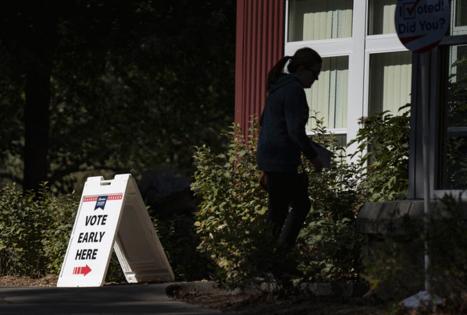North Carolina elections board launches plan to retrieve missing data from nearly 200,000 voters
Published in News & Features
RALEIGH, N.C. — The North Carolina State Board of Elections launched a comprehensive “Registration Repair” plan Thursday to retrieve missing information from more than 100,000 voters, with its director rebutting concerns that the effort could lead to eligible voters being disqualified.
The plan, which was approved in a unanimous vote by the bipartisan board last month, comes in the wake of numerous legal challenges (including from President Donald Trump’s Department of Justice and former state Supreme Court candidate Jefferson Griffin) that have alleged that the missing information could lead to voter fraud — though no evidence of it has been provided.
While the board hopes its plan will resolve those legal issues, it could raise new ones.
Last week, the Democratic National Committee threatened legal action against the board if it went through with the plan, warning that it could obstruct voting rights and accusing the Republican-led board of “colluding with President Trump’s Justice Department.”
“I want to make it abundantly clear that this project will not result in the removal of any eligible voter from the voter rolls,” Sam Hayes, the board’s executive director, said at a press conference. “... Instead, it will result in more complete voter rolls and full compliance with state and federal law.”
The state’s plan aims to address the roughly 200,000 voters for whom they lack a driver’s license number or the last four digits of a Social Security number, which are required by the national Help America Vote Act.
About half of those voters have already provided the missing information, election officials said, but it doesn’t show up in state databases due to clerical errors or name matching issues — neither of which is the voter’s fault. They’ll be able to vote normally as the board attempts to complete their registrations by scouring its own records and eventually contacting them directly.
The bulk of the plan launched Thursday, however, targets the other half of the affected voters — the roughly 103,000 people who the board says never provided the required identifying information.
Starting in August, a series of mailers will be sent to them requesting that they provide the missing information either online through the DMV website, in person at their county election board, or via a prepaid return envelope included in the letter.
Affected voters who don’t update their registration by the next election will have a notice added to their file that will prompt poll workers to request the information when they show up to vote.
They will also have to cast a provisional ballot at the polls, which triggers a special review of each ballot after Election Day and could result in their vote being thrown out.
In its letter to the board, the DNC said this would “effectively remove” the affected voters from the official list of eligible voters — but Hayes disagreed.
“Whether or not that particular ballot were to count, it’s not removing them from our voter rolls,” he said.
Paul Cox, the board’s general counsel, further explained that voters who have to cast a provisional ballot for this reason will be given the opportunity to show a driver’s license or Social Security number at the polls. If that number validates with the DMV or Social Security Administration, their ballot will count.
The board has launched a Registration Repair website to answer questions about the plan.
Included in the website is a searchable database of the 103,000 voters whom the board says have never provided the HAVA information. That database can be found at dl.ncsbe.gov/RegistrationRepair/index.html.
Hayes said the site will be updated daily as voters begin to complete their registrations.
The board’s plan comes in the wake of Griffin’s unprecedented effort to overturn his narrow loss in the 2024 Supreme Court election. The missing registration numbers formed the basis for his main legal challenge, in which he argued that more than 60,000 ballots should be thrown out.
While his efforts were ultimately unsuccessful, the issue surrounding the registration information has persisted, prompting a lawsuit from the DOJ in May.
Hayes said the board has worked with the DOJ and believes the current plan will resolve their concerns and end the ongoing litigation.
_____
©2025 The News & Observer. Visit at newsobserver.com. Distributed at Tribune Content Agency, LLC.







Comments